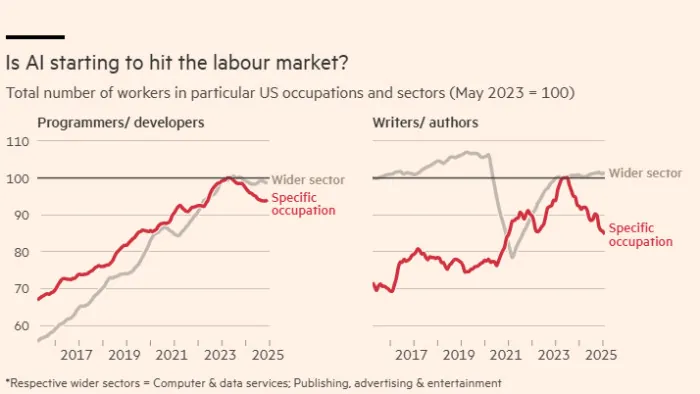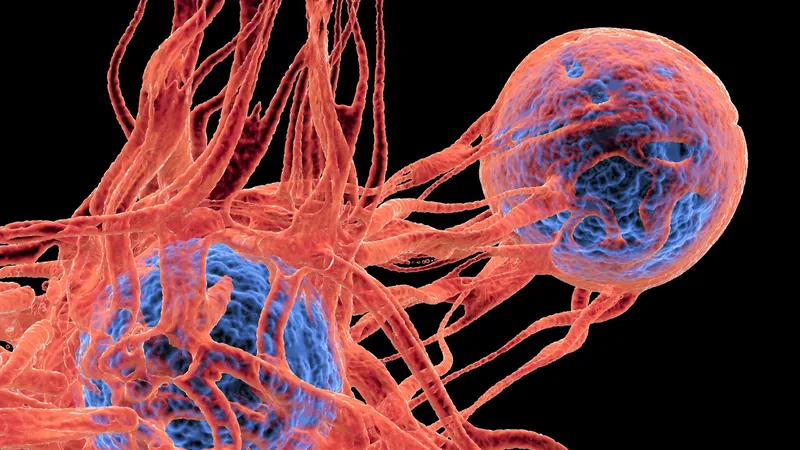
School Psychology Class: Is AI Really Threatening Your Job?
2025-04-07
Author: Wei
Introduction
In the ever-evolving landscape of technology, artificial intelligence (AI) has undeniably made its mark across various industries, from writing to software development. However, there's an intriguing question that many educators and professionals are pondering: Why hasn’t AI taken your job yet?
Correlation vs. Causation
Recent discussions highlight a connection between the rise of AI and a noticeable decline in job opportunities in certain sectors. It's crucial to understand that while there may appear to be a correlation, correlation does not imply causation. Just because AI is on the rise doesn't necessarily mean it is the sole reason for employment drops in sectors like writing and software development.
AI's Capabilities and Limitations
To illustrate this point, we must explore the differences in tasks assigned to AI. Research indicates that AI excels in handling 'least messy' tasks—those that are structured and predictable. These include simple data entry or algorithmic tasks, where AI can process information at astounding speeds, outperforming human capabilities. However, when it comes to 'messy' tasks—those that require human intuition, emotional intelligence, and creativity—AI falls short. These tasks encompass areas like nuanced writing, complex problem-solving, and interpersonal communication, where human expertise remains essential.
The Task Handling Gap
A visualization of AI’s task-handling abilities would show a significant gap between messy and least messy tasks. Interestingly, while AI is gradually improving its performance in the realm of more complex tasks, it's important to raise the question: is this gap really closing? Experts argue that while advancements in machine learning and neural networks are promising, the uniquely human skills required for messy tasks are still far from replicable by AI.
Cognitive Psychology and AI
Delving deeper into the cognitive approach to psychology, we see a reflection of this interplay in what is known as the 'computer model.' This model likens the brain to a computer, processing information and responding to inputs. However, true cognitive processes involve intricate emotional responses and subjective experiences that are not fully captured by any computer analogy.
Implications for Psychology Students
So, what does this mean for students in psychology and related fields? As we explore the relationship between AI and the workforce, it becomes increasingly clear: while AI may streamline or even transform certain processes, the need for human ingenuity and emotional intelligence remains irreplaceable, creating a robust job market for those equipped with these invaluable skills.
Conclusion
As we forge ahead, the question will continue to linger: Will AI evolve to handle more complex tasks, or will there always be a core component of human expertise that keeps us at the forefront of our professions? The discussion is far from over, and as students of psychology, it’s essential to stay informed and critically engaged with these technological advancements. Stay tuned for more insights into the future of work in the age of AI!





 Brasil (PT)
Brasil (PT)
 Canada (EN)
Canada (EN)
 Chile (ES)
Chile (ES)
 Česko (CS)
Česko (CS)
 대한민국 (KO)
대한민국 (KO)
 España (ES)
España (ES)
 France (FR)
France (FR)
 Hong Kong (EN)
Hong Kong (EN)
 Italia (IT)
Italia (IT)
 日本 (JA)
日本 (JA)
 Magyarország (HU)
Magyarország (HU)
 Norge (NO)
Norge (NO)
 Polska (PL)
Polska (PL)
 Schweiz (DE)
Schweiz (DE)
 Singapore (EN)
Singapore (EN)
 Sverige (SV)
Sverige (SV)
 Suomi (FI)
Suomi (FI)
 Türkiye (TR)
Türkiye (TR)
 الإمارات العربية المتحدة (AR)
الإمارات العربية المتحدة (AR)